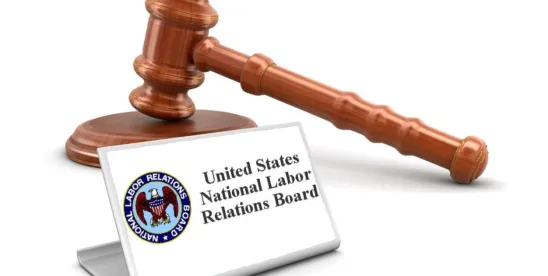On November 13, 2024, the National Labor Relations Board (“NLRB”) issued a sharply divided decision in Amazon.com Services LLC, overruling yet another decades-old rule and holding that captive-audience meetings violate national labor law after being lawful since 1948.
Captive-Audience Meetings. A captive-audience meeting occurs when employees are required to attend a meeting where the employer expresses its views on unionization. Under Section 8(c) of the National Labor Relations Act (the “Act”), employers are allowed to express those views so long as there is “no threat of reprisal or force or promise of benefit.” In 1948, the NLRB decided in Babcock & Wilcox Co. that the Act generally does not prohibit captive-audience meetings, even when attendance is compelled through implicit or explicit threats of discipline.
The New Ruling. Calling the Babcock & Wilcox rule “largely unexplained” and “flawed as a matter of statutory policy,” the NLRB majority overruled the 76-year-old decision and held that captive-audience meetings and “other similar mandatory employer-employee encounters” are unfair labor practices under Section 8(a)(1) of the Act. The majority explained that such meetings “have a reasonable tendency to interfere with and coerce employees in the exercise of their Section 7 right to freely decide whether or not to unionize” when employees should “be free from such domination.” Under this decision, an employer violates the Act whenever it requires employees to attend a meeting for the employer to express its views on unionization, regardless of whether those expressions support or oppose unionization.
What Meetings are Allowed? Under the majority’s decision, a voluntary workplace meeting during work hours is lawful if, reasonably in advance of the meeting, the employer provides and follows through with the following assurances to its employees:
- The employer intends to express its views on unionization at a meeting at which attendance is voluntary;
- Employees will not be subject to discipline, discharge, or other adverse consequences for failing to attend the meeting or for leaving the meeting; and
- The employer will not keep records of which employees attend, fail to attend, or leave the meeting.
The Dissent. Member Kaplan, in a lengthy dissent, argued that an employer’s right to hold a captive-audience meeting is supported by the free speech provision in Section 8(c) of the Act, that they are not coercive, and that the majority’s decision unconstitutionally infringes on an employer’s right to free speech.
To comply with the NLRB’s majority decision, employers should carefully adhere to the above guidelines for voluntary meetings.







 />i
/>i

